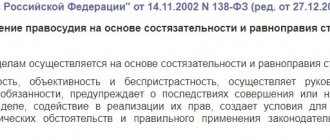What does regression mean?
Regression describes three aspects of a relationship:
- The injured party who suffered losses due to the fault of the debtor and has the right to demand payment of the debt.
- A debtor who had an obligation to pay.
- A creditor who was forced to compensate for losses to the first person instead of the debtor, taking over the right to demand payment of the debt.
Regression, according to Article 1081 of the Civil Code of the Russian Federation, is expressed in the following situations:
The driver of a transport company damaged the movable property of another road user. The employer compensated for the damage caused, after which he received the right to file a recourse claim against the driver in order to receive compensation.
The insurance company demands compensation for losses from a citizen who has an insurance policy of this organization. This situation occurs if the circumstances of the accident were as follows:
- the vehicle was driven by a citizen who was intoxicated;
- the vehicle was driven by a citizen who did not have a driving license, which could be confiscated for an offense;
- After the incident, the driver disappeared without waiting for the traffic police officers.
The citizen caused damage to the injured party, the restoration of which was paid for with the help of social insurance.
A citizen, while managing a source of increased danger, caused damage to a third party, which was compensated by the employer or owner of the product.
Note!
This source refers to various substances, means and objects that can cause harm to others. This list includes working with explosive materials, managing large equipment, etc.
According to the current laws of the Civil Code, the owner of such property is responsible for any damage caused. However, he retains the right to claim damages from the person who controlled the source at the time of the accident if his guilt is proven.
In addition to the listed norms, there are also other clauses of the Civil Code regulating the possibility of filing a recourse claim. Such articles are:
- 147 - regulates responsibility for securities management;
- 325 - establishes obligations to participants in debt relations. A person who reimburses the full cost of a debt to a creditor has the right to claim this amount in a recourse procedure, deducting his own share from other participants in the relationship;
- 379 - article on bank guarantees;
- 399 - law on subsidiary obligations.
Legal relations similar to recourse
In judicial practice, the concept of recourse is blurred. An example of this would be the relationship between a borrower, a lender and a guarantor. If the borrower ignores the demand for repayment of the debt, then after the established period, the obligation to repay passes to the guarantor. In this case, the guarantor assumes all the rights and obligations of the borrower, in accordance with Article 365 of the Civil Code of the Russian Federation.
Thus, the conflict cannot be classified as regressive, since it does not correspond to the description of this term in the legislation. That is why the percentage of guarantee refusals is growing every year.
In addition, it is worth considering the cases in which the court will refuse to initiate proceedings:
- parents, guardians or trustees have covered the damage caused by the child and are demanding recovery of funds from the minor citizen by way of recourse;
- parents, guardians or trustees covered the damage caused by the incapacitated person from whom they are demanding to recover the funds paid.
Analytics Publications
(Decision of the Supreme Court of the Russian Federation dated 01.06.16 No. 301-ES15-18581 in case No. A31-8643/2014)
According to Part 1 of Art. 1081 of the Civil Code of the Russian Federation, a person who has compensated for damage caused by another person has the right to claim back (recourse) against this person in the amount of the compensation paid, unless a different amount is established by law. As a general rule, the debtor under a recourse claim is obliged to reimburse the creditor for the payment he made to a third party in full.
In the electric power industry, a fairly common basis for the emergence of a recourse obligation is the recovery of losses from the supplier of electrical energy (supplier of last resort, energy sales organization), due to the failure of the network organization to fulfill its obligations for the uninterrupted supply of electrical energy to the end consumer's power receiving devices. However, in practice, network organizations, as an objection to recourse claims, claim that the losses resulted from disruptions in the operation of the power grid located in the networks of third parties. In this regard, there was legal uncertainty regarding the choice of the appropriate defendant (a network organization under a service agreement or another network organization), as well as the admissibility of filing a recourse claim if another network organization was at fault.
The answers to these questions were obtained during the consideration of a specific dispute by the Supreme Court of the Russian Federation.
Consideration of case No. A31-8643/2014 by lower courts
The public joint-stock company "Kostroma Distribution Company" (hereinafter referred to as the sales company, the Plaintiff) filed a claim with the Arbitration Court of the Kostroma Region against the public joint-stock company "Interregional Distribution Grid Company of the Center" represented by the branch "Kostromaenergo" (hereinafter referred to as the network company, the Defendant) about recovery of RUB 2,142,654. 43 kopecks losses. The Plaintiff justified the existence of losses by the emergence of a recourse obligation in terms of compensation for the amount of damage recovered in another case[1] in favor of the end consumer - Closed Joint Stock Company Poultry Farm Kostromskaya. The Public Joint Stock Company "Federal Grid Company of the Unified Energy System" represented by its branch, the Volga-Oka Enterprise of Trunk Electric Networks (hereinafter referred to as the Third Party, FSK Company), was involved in the case as a third party who does not make independent claims regarding the subject of the dispute.
By the decision of the Arbitration Court of the Kostroma Region dated January 26, 2015, the claim of the sales company was partially satisfied. RUB 2,109,108 was recovered from the network company in favor of the sales company. 88 kop. losses[2].
By the decision of the Second Arbitration Court of Appeal dated 04/14/15, left unchanged by the decision of the Arbitration Court of the Volga-Vyatka District dated 09/30/15, the decision of the first instance court was canceled and the stated claims were denied.
Judicial acts of the courts of appeal and cassation are based on the fact that the technical cause of the accident, which resulted in a break in the supply of electrical energy, was damage to the loop due to long-term operation, a decrease in the capacity of the loop wire due to partial destruction of the aluminum layer inside the metal pipe. In this case, the specified equipment is located on the network site of the FSK company. Accordingly, the Defendant is not the causer of harm (losses), and the said harm is subject to recovery from a third party in separate proceedings.
The Plaintiff did not agree with the arguments of the Second Arbitration Court of Appeal and the Arbitration Court of the Volga-Vyatka District and filed a cassation appeal to the Supreme Court of the Russian Federation, pointing out the contradiction of the conclusions of the courts of appeal and cassation with the norms of substantive law and the agreement concluded between the Plaintiff and the Defendant.
The applicant’s position when filing a complaint with the Supreme Court of the Russian Federation
The sales company, referring to the terms of the agreement concluded by the parties for the provision of services for the transmission of electrical energy and the direct connection of the consumer to the Defendant’s networks, points to the improper fulfillment of obligations by the Defendant.
, responsible for the transmission of electrical energy of appropriate quality received from the networks of the FSK company.
The plaintiff also points out the fact that the right to bring a Third Party to tort liability does not exclude the right of the guaranteeing supplier, on the basis of an agreement for the provision of services for the transmission of electrical energy, concluded with a network company, to demand recourse compensation for losses from the party under the agreement.
Position of the Supreme Court of the Russian Federation
When adopting a judicial act, the Judicial Collegium for Economic Disputes proceeded from the following.
1. The conclusion of an agreement for the provision of services for the transmission of electrical energy is regulated by the Rules of Non-Discriminatory Access, [3] from clause 15 of which it follows that when executing the agreement, the network organization is obliged, among other things, to ensure the transmission of electrical energy at the point of delivery of the service consumer (electricity consumer, in particular in whose interests the contract is concluded), the quality and parameters of which must comply with technical regulations in compliance with the values of emergency and technological armor.
2. In accordance with clause 30 of the Basic Provisions[4], within the framework of the energy supply agreement, the supplier of last resort is liable to the consumer (buyer )
for failure to fulfill or improper fulfillment of obligations under the contract, including
for the actions of a network organization engaged to provide services for the transmission of electrical energy, as well as other persons engaged to provide services that are an integral part of the process of supplying electrical energy to consumers.
3. The existence of grounds and the extent of liability of electric power industry entities to consumers for actions (inaction) leading to adverse consequences are determined in accordance with the civil legislation of the Russian Federation and the legislation of the Russian Federation on the electric power industry (clause 7 of the Basic Provisions).
4. Based on the provisions of the above norms, the responsibility for transmitting electrical energy of proper quality is assigned to the network company as the owner of electrical network equipment, and the liability of the sales company to the consumer for causing losses due to the supply of electrical energy of inadequate quality to the consumer in this case is liability for the actions of third parties who were entrusted with the execution
(Article 403 of the Civil Code of the Russian Federation).
5. A sales company that has fully compensated for the losses caused to the consumer by the supply of electrical energy of inadequate quality has the right to reimburse all expenses incurred as a result of this from the person with whom it has concluded an agreement for the provision of services for the transmission of electrical energy.
6. Since the process of supply (including transmission) of electrical energy is regulated by law through the conclusion of various types of contracts on the wholesale and retail markets, the consistent provision of transmission services
(grid company on the wholesale market - territorial grid organizations - consumers (guarantee suppliers and sales organizations)), the guaranteeing supplier, on the basis of an agreement concluded by the parties for the provision of services for the transmission of electrical energy, concluded with the grid company, has the right to apply for compensation for losses
to the party under the contract despite that the cause of poor quality services arose on the equipment of another person.
7. The possibility of bringing a Third Party to tort liability does not exclude the use by the distribution company (consumer) of another method of protection arising from the agreement with the network company.
Based on the results of the consideration of the case, the decision of the Second Arbitration Court of Appeal dated 04/14/15, the decision of the Arbitration Court of the Volga-Vyatka District dated 09/30/15 in case No. A31-8643/2014 of the Arbitration City of the Kostroma Region was canceled, and the decision of the Arbitration Court of the Kostroma Region dated 01/26/15 The present case is upheld.
As we can see, the position of the Supreme Court of the Russian Federation is based on the application of the provisions of Art. 403 of the Civil Code of the Russian Federation, by virtue of which the debtor is responsible for non-fulfillment or improper fulfillment of the obligation by third parties who were entrusted with execution, unless the law establishes that the responsibility is borne by a third party who is the direct executor.
Therefore, the Supreme Court of the Russian Federation indicated that, regardless of whose power grid system the disruptions occurred, the electricity supplier in any case has the right to file a recourse claim against the network company with which it entered into an agreement.
Thus, the legal position of the Supreme Court of the Russian Federation in case No. A31-8643/2014 is aimed at streamlining relations between participants in the electrical energy market in relation to compensation for losses caused by non-compliance with the quality parameters of electrical energy caused by an interruption in the energy supply to the end consumer.
[1] In case No. A31-13484/2013, 2,109,108 rubles were recovered from the Plaintiff in favor of ZAO Kostromskaya Poultry Farm. 88 kop. losses arising in connection with the failure to ensure reliable supply of electrical energy within the framework of the concluded energy supply agreement dated February 12, 2007 No. 36.
[2] The court of first instance refused to collect from the network organization the state duty payable by the Plaintiff in case No. A31-13484/2013.
[3] Rules for non-discriminatory access to services for the transmission of electrical energy and the provision of these services, approved by Decree of the Government of the Russian Federation of December 27, 2004 No. 861.
[4] Basic provisions for the functioning of retail electricity markets, approved by Decree of the Government of the Russian Federation dated 04.05.12 No. 442.
Statute of limitations
The legislation of the Russian Federation states that the basic limitation period is 3 years. This period also applies to recourse claims. However, it can be changed by the terms in the agreement that is drawn up between the lender and the borrower.
The period of 3 years begins to count from the moment when the third party covered the damage caused by the culprit to the injured party. After the expiration of the period, the applicant will be refused to initiate legal proceedings if he does not provide evidence of absence for a valid reason.
Sample
It is often difficult for citizens to draw up a statement of claim in court on their own; sometimes they resort to the help of lawyers, but they do not always have additional funds for this. Therefore, in this section we will provide a sample statement of claim in the order of recourse, using which you can draw up your own claim. This sample was compiled by experienced lawyers taking into account the latest changes in the legislation of the Russian Federation.
Download
Sample claim by way of recourse.doc
This sample has a standard form, so it can be used to draw up regression claims on various topics.
In addition to drawing up the claim, it is necessary to collect all the required documents, since if any document is not submitted, then the claim may be refused. If the claim is drawn up according to our sample, and you have submitted all the required documents, rest assured that your claim will be considered by the court. If you are still not sure whether to fill out the sample correctly, you can always contact the site’s lawyers for additional advice.
What you need to know when preparing a recourse claim
To initiate legal proceedings, it is necessary to provide documents confirming the fact of evasion of debt by the person responsible for the incident. To do this, you must send a written claim, in which you must indicate in free form the contact information of the sender and recipient of the paper, the essence of the claim, the date and signature of the applicant.
If the paper is sent to the place of residence of the culprit, and after three months from the date of delivery of the document there is no response, a copy of the claim must be attached to the lawsuit. You can also send documents by registered mail with a delivery notification order.
To draw up a statement of claim, you need to know the following information:
- defendant's contact details. Judicial proceedings can be initiated in the department of the executive body that belongs to the place of residence of the culprit. Therefore, it is necessary to find out the place of official registration;
- conflicts in which the amount is less than 50 thousand rubles are considered by a magistrate. If the amount exceeds this limit, then the claim is considered in general courts;
- When applying to the court office, you must provide a statement of claim drawn up in triplicate. One of them is registered and returned to the applicant, the second remains for consideration, and the third is sent to the defendant.
To be considered, a recourse claim must have the following data:
- at the top of the document it is necessary to indicate the name of the court department at the defendant’s place of residence;
- FULL NAME. participants in the conflict;
- a detailed description of what happened. Free form is allowed, however, to avoid inaccuracies and ambiguities, it is recommended to contact a qualified lawyer;
- date and time of the incident;
- damage incurred as a result of the actions of the culprit;
- date and time of compensation to the third party. You must also provide bank details, payment amount and transaction ID;
- reference to regulations and agreements, according to which the plaintiff covered the losses of the culprit.
The amount recovered must include any costs associated with legal proceedings: examinations, lawyer services, payment of state fees, etc.
You can participate directly at the court hearing in person, or hire an official notarized representative who will defend the interests of the applicant.
Sample statement of claim for recovery by way of recourse
A ready-made sample of a recourse claim can be found in the office of a judicial institution or on our website. With its help, you can fill out a statement of claim yourself without the need to contact a law firm.
List of grounds for recourse claim
A recourse claim cannot always be filed; for this there must be grounds that coincide with legal requirements, namely:
- Reimbursement of expenses for compensation of damage that was caused jointly with other persons;
- Collection of insurance payments under compulsory motor liability insurance from the culprit of the accident by the insurance company that has already paid the insurance premium;
- Recovery of funds from an employee for damage caused to another person when the employer has paid compensation;
- Collection of part of the rent that other family members or other persons paid instead of the debtor.
For other reasons, filing a claim by way of recourse will not be possible.
After the decision
After analyzing judicial practice, one can notice that the vast majority of recourse claims are satisfied. In this case, the amount of compensation can be either full or partial. If a dispute arises between the parties to the conflict regarding the established compensation, the judge can personally regulate the amount of compensation. As arguments, the defendant may point to inflated costs of legal proceedings.
In order to receive full reimbursement of expenses, it is necessary to provide evidence that has legal force, which will indicate the necessity of using various measures to conduct proceedings.
After a court decision is made, each participant in the judicial review has a period established in the current legislation - 1 month, within which they can file an appeal. To do this, it is necessary to provide relevant evidence indicating unlawful actions of the judge, or additional circumstances.








